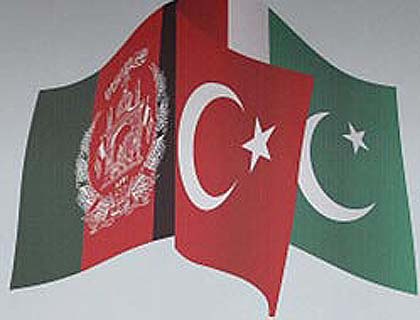The Istanbul regional conference is to kick off today with United States, France, Germany, Pakistan, Afghanistan,Turkey and the NATO countries as well as representatives of the United Nations participating in it. The conference will discuss the security transition in Afghanistan, training and capacity building of Afghan security forces and the political way aimed at seeking out an end to the conflict in Afghanistan. Above all, the draft proposal on a new regional framework prepared in Kabul and Oslo months ago will come under discussion. President Hamid Karzai is expected to announce the second phase of security hand-over from NATO to Afghan forces.
The conference is deemed an important platform for Afghanistan and Pakistan to work for giving up the blame game and start a new chapter of cooperation. A day before the Istanbul conference, on November 1, the 6th trilateral summit in which leaders of Afghanistan, Pakistan and Turkey participated was held in which various issues pertaining to economy, politics and security were discussed.
The Turkish government which hosted the summit, believes that the event could end a blame game over a series of attacks that have deepened mutual mistrust between the US, Afghanistan and Pakistan. The summit had no significant difference from the five summits that have been so far held. However, the world is deeming today's conference as quite beneficial for Afghanistan.
The issues in the region have become so complex that conferences such as that of Istanbul fall tiny to resolve them. Pakistan that is considered to have a pivotal role in bringing peace to Afghanistan and the region, has already expressed its opposition over the idea to a new regional framework. "We believe there is no need of any new regional mechanism as regional security issues can be dealt with within the existing regional framework," a Pakistani official told The Express Tribune. "Pakistan will certainly oppose the idea," said the official, who requested his name not be mentioned in the report. "Pakistan is not the only country which has reservations … many other countries are also against it."
The level of cooperation between the countries in the region in the last ten years has been insufficient as problems of insecurity have become manifold. At this time, Pakistan really needs to be a doer than a talker. For the sake of its own security, it has to improve ties with its neighbors and the United States.
And for that according to many there is a need for a new regional framework with new strategy and policies based on sincerity.
Afghanistan accuses Pakistan for supporting the terrorists. It has demanded the US to put more pressure on Pakistan. The US also believes that Pakistan intelligence agency, ISI, is supporting Taliban and Haqqani network by providing them training, equipment and funds. The US-Pak relations have, specifically, deteriorated after Osama bin Laden was killed on Pakistan land and US base and Embassy in Afghanistan got attacked by Haqqani network a few months ago.
In response to all the allegations, Pakistani authorities have always tried to exhibit that their government is playing a vital role in countering terrorism as Pakistan itself is a victim of insurgency and it has suffered the worst forms of insurgency after the US invasion of Afghanistan.
Therefore, they say the world should not doubt the intentions of Pakistan in counterinsurgency war. Speaking about strained relations with the US, Pakistani President, Asif Ali Zardari said on Monday that he was looking forward to a new chapter with the US, saying the Osama bin Laden issue was "history". "We should look forward into the future and ensure that the militant mindset is defeated. The sooner we stop the public criticism and finger-pointing and coordinate our resources, the better it will serve the cause of peace and stability and the fight against extremism and militancy," Zardari said.
As the Afghan war has already started its second decade and security has gone worse in Afghanistan and Pakistan, there is a pressing need for sincere cooperation among the countries involved in Afghanistan. If the US-Pak relation further worsens, it will have deep negative impacts on the conditions in Afghanistan too. Therefore, Istanbul Conference is a platform for Afghanistan, Pakistan and the US to rethink their relations.
Another issue under focus in today's conference is the process of security transition. President Hamid Karzai is expected to announce the second phase of security hand-over from international to Afghan security forces. 17 more areas will come under the Afghan control. With this the total number of areas that will be handled by Afghan army and police will become 24 as the security responsibilities of seven areas have already been handed over to Afghan security forces.
The countries attending the Istanbul Conference are expected to renew their commitments towards training and equipping the national army and police force of Afghanistan. With the processes transition of security and withdrawal of NATO forces going on, concerns over the future defense of Afghanistan also have increased. Afghanistan defense sector need long term international support.
It is hoped that commitments made in the Istanbul Conference will not remain confined to paper only - like many of the previous conference and summits. Although the people in Afghanistan have very low expectation from such conferences, at this crucial juncture today's conference is deemed an important opportunity for Afghan government to boost ties with countries in the region and highlight the importance of capacity building and equipping of Afghan security forces.

